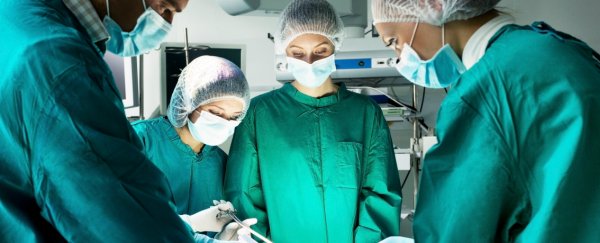A preliminary study has found that children who were given general anaesthetic for surgery before the age of four had slightly lower IQs, diminished language comprehension and less grey matter density in the posterior regions of their brains than their peers later in life.
It's important to note that these children's scores were still in the normal range for their age group, and this research in no way means that general anaesthetic isn't safe for young children or that it shouldn't be used. But the researchers believe their results are cause for further investigation into the precise molecular effect that anaesthetic has on the developing brain.
"The ultimate goal of our laboratory and clinical research is to improve safety and outcomes in young children who have no choice but to undergo surgery with anaesthesia to treat their serious health concerns," Andreas Loepke, the lead author of the study from Cincinnati Children's hospital in the US, said in a press release. "We also have to better understand to what extent anaesthetics and other factors contribute to learning abnormalities in children before making drastic changes to our current practice, which by all measures has become very safe."
The study came after Loepke found that general anaesthetic caused widespread cell death in the brains of lab rats and mice. This led them to believe that, if a similar process was happening in humans, it could be interfering with the neurodevelopment of young children during a particularly sensitive part of their development, potentially leading to long-term damage.
To investigate further, the researchers performed a language development study on 106 healthy children aged between five and 18. Half of the participants had undergone surgery before the age of four and had been given general anaesthetic, while the other half had no history of surgery.
While all 106 children scored in the normal range, those who had gone under general anaesthetic before the age of four performed significantly lower in the listening comprehension and performance IQ part of the test than their peers who hadn't had surgery. MRI scans revealed that these lower scores were also associated with less grey matter density in the occipital cortex and cerebellum regions of the children's brains.
Other than their surgical history, the children were matched by age, gender, whether they were right- or left-handed and also their socioeconomic background - all of which are known to affect brain structure.
But the researchers stress that their findings, which have been published in the journal Pediatrics, are preliminary, and further research is now needed to work out exactly what effect general anaesthetic has on the developing brain. Loepke also insists that the effects of not undergoing surgery are usually far worse for children than any potential impact of general anaesthetic.
"It is important to note that no surgeries are truly elective in young children," said Loepke. "Many surgical procedures early in life treat life-threatening conditions, avert serious health complications, or improve quality of life. These cannot be easily postponed or avoided."
The good news is that, if the researchers can work out exactly how anaesthetic affects developing brain cells, they can then come up with ways to stop this from happening. In fact, certain drugs are already being tested for their ability to lessen the harmful effects of anaesthetics. Bottom line: surgery is already incredibly safe, but science is going to keep making it safer.
